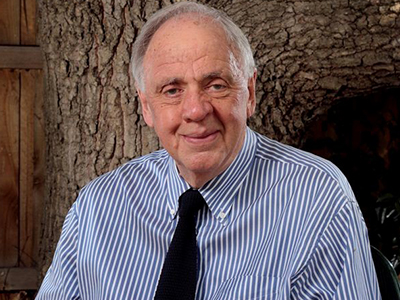

 Denis White built a career around strategic planning, and he thought he’d better start planning as soon as possible after being appointed the second executive director of what was then known as the Trinity Education Centre (TEC) very late in 1990.
Denis White built a career around strategic planning, and he thought he’d better start planning as soon as possible after being appointed the second executive director of what was then known as the Trinity Education Centre (TEC) very late in 1990.
So he turned up at the college on 2 January 1991 eager to start, only to find the place all locked up. Ah, summer holidays.
Phone calls to Tony Buzzard and Bill Cowan of TEC’s management committee brought the offer to inspect some files Bill held at home, and Denis got to work until holidays were over, and the job of elevating the fledgling Foundation Studies program to its full potential could begin.
‘The program had perhaps been let go a bit in the last few months,’ recalls Denis, who discovered that with no developed set-up, he’d have to do it all.
‘The relationship with the university was weak, our financial situation was weak,’ he says. ‘But we had a good program, and some very good teachers. So rather than look back and fix what had gone wrong, I decided to start afresh.’
For Denis, it was a return to a world he thought he’d never leave.
Raised in Glen Iris in Melbourne, he was initially interested in going into the church, as his grandfather had been a Methodist minister. A professor of theology advised him to do philosophy but combine it with political science so as to “keep my feet on the ground”, Denis says.
He did his masters on the philosophy of Edmund Burke, which gave him a “wonderful grip on the reality of the complexity of life and politics”, and his PhD on moral responsibility, looking at the conditions under which it’s appropriate to hold people morally responsible, although he admits: ‘I’ve largely forgotten what I thought those conditions were.’
By now his career interests lay in academia, and he taught politics at Monash University. He also wrote books on the philosophy of the Liberal Party and on his philosophy of life, and in 1980, after a ‘two-minute interview’ with Malcolm Fraser, he became an adviser in the prime minister’s private office, before ‘falling into’ the role of speechwriter. His task, Denis says, was to write speeches that expressed and extended the PM’s thinking. ‘I never saw the job as having anything to do with my own thinking.’ Denis eventually became director of Fraser’s office, which today would be deemed chief of staff.
When the Coalition lost power in 1983, Denis returned to Monash but also set up a consultancy around the idea of strategic planning. ‘Strategies weren’t very popular at that time but I got interested in the question of why governments fail and I thought it was because they weren’t very good at identifying key issues.’
It was in this mindset that he was attracted to the advertisement for TEC, especially as he had insights into the channels for Asian students to study in Australia through his acquaintance with the Colombo Plan in his Fraser years.
Denis was initially worried that only half of the 70 students he was told were enrolled in the program for 1991 had accepted, and he travelled to Malaysia and Singapore to find some more. He wanted to engage their minds to the opportunities Foundation Studies afforded, especially the ‘pot of gold at the end of the rainbow’ that was Melbourne University.
Denis says the university supported the Trinity initiative, and from the very highest level, but it was concerned about ‘misunderstandings and issues in the first year’. He was also mindful that FS should be attractive to the university. ‘So we had to have a good selection process, good teaching and really good courses. What a university wants is good students. And if we could deliver them, the university would like us. That was how it turned out.’
Success took time, with student numbers growing slowly. ‘We got enough, combined with a ‘razor gang’ to ensure that the inevitable loss in my first year there was manageable.’ The program almost broke even in 1992, and the numbers grew exponentially after that.
The watershed period was the mid-1990s when the university actively sought more international students, and Trinity College Foundation Studies was in the right place to deliver.
‘So Trinity had to change its tune a bit on maximum numbers,’ Denis says.
And by the time Denis was ready to move on in late 1998, that had been achieved. ‘It is fair to say that by then, Trinity’s Foundation Studies program was a recognised and respected international brand,’ he recalls. ‘The Trinity foundation program itself was a secure and esteemed pathway into the University of Melbourne for international students, and the Trinity Education Centre (which is now the Pathways School) had made Trinity College financially successful beyond its wildest dreams.’
But what good is a dream without a strategic plan – and planner – behind it.
Denis has published a book about his time at Trinity titled The University Dream, available for sale in the Trinity online shop.
By Jeremy Bourke
